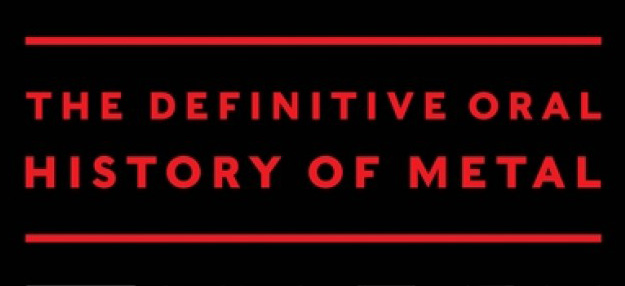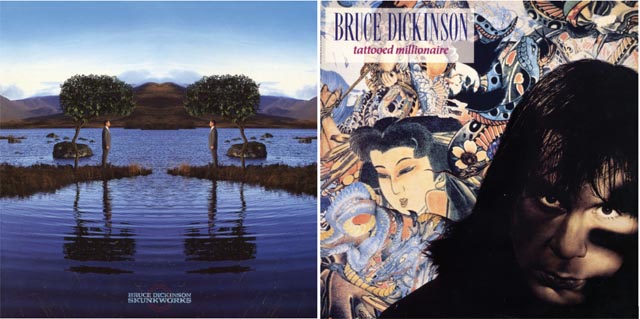 I notice you have a lot of interviews from over the years – Cliff Burton is there for example – were the interviews drawn from the magazines you’ve worked for and interviews you’ve done? Were there legal problems? Did you have to clear it with some of the magazines you’ve worked with or stories you’ve written to get the interviews in there?
I notice you have a lot of interviews from over the years – Cliff Burton is there for example – were the interviews drawn from the magazines you’ve worked for and interviews you’ve done? Were there legal problems? Did you have to clear it with some of the magazines you’ve worked with or stories you’ve written to get the interviews in there?
Jon: We owned almost everything. A lot of the interviews are new – more than half. The older stuff that’s from publications, Magazines either own your stuff or they own the first rights to your stuff, and when they own the first rights, you can do whatever you want with it once they’ve published it. There were a couple cases – I’d done a bunch of pieces for Penthouse, and I needed to reference each of those. The editor gave me their blessings. I think Katherine had the same issues with a couple of pieces.
Katherine: With RIP Magazine, RIP is by Larry Flynt, so of course he’s had a lot of lawsuits thanks to Hustler and his adult titles, but RIP ceased publication sadly, but I called up and they said “Yes, you can use anything of yours, and if you want to use anything from the other writers for the magazine, just get their written permission”. They were great with that. They’d already dealt with Lonn Friend, who’d previously done a book and used some of his stuff. I think as long as it wasn’t some tell-all Larry Flynt publishing story, they were really supportive and happy because RIP has a cool legacy.
You’re saying more than half the interviews are newer ones. Do you have a real percentage?
Jon: That’s why it took four years to write (laughs). I sat down with all the members of Black Sabbath. The Ozzy interview was a little older, but Katherine had a new Ozzy interview from this last cycle. They were extremely generous with their time. I talked to Tony Iommi for two hours at a time when he was working on his own book. It’s funny, because at the end of the interview he said “Bloody hell, I’ve told you so much I don’t know what I’m going to include in my own book that I haven’t told you”. We did have the cooperation from so many people – Judas Priest was extremely giving with their time as well.
Katherine: I think what we found was every time you talk to someone new, they turned you on to someone else new, and it could have gone on forever…we have Cheryl Rixon who was the Penthouse Pet in a photo with Rob Halford. She said “why don’t you talk to my friend here?” or “talk to Corky Laing from Mountain about proto-metal”, and he’ll be like “Oh, you should talk to Leslie West, because he remembers this”, and then they say “talk to this roadie, because there’s that story”. So I think the new interviews could have gone on and on and on because so many people were turning us on to other people with great perspectives and stories. I think that’s what’s different about this book – we do get a lot of different angles. I talked a lot to Neil Turbin (early Anthrax). Jon talked more to Scott Ian.
Jon: I talked to Paul Di’Anno from early Iron Maiden.
Katherine: I found Terry Glaze, the original Pantera singer online and talked to him. It really could have taken us eight years to write and have been twice as long, but that probably wouldn’t have done anyone any good.
Were there any people that said no that didn’t want to be in the book?
Katherine: I will say that my favorite person who said no, and I think really one of the only ones was Yngwie. Neither Jon nor I are huge shred fans, but I reached out to him. I believe his wife was his manager/publicist. She turned us down once and I didn’t pursue it too hard. I was like “all right. His choice”. We’ve got Rob Halford writing an afterward, but if Yngwie doesn’t want to participate, that’s fine. And then of course Ritchie Blackmore never does interviews.
Jon: He’ll only talk about his current Renaissance music.
Katherine: He won’t even do that, I think. We could have probably talked to his wife about him maybe…
Jon: Fortunately, we were able to get some stuff about Deep Purple from past interviews. A good friend of mine did a piece I assigned to him when Ritchie was talking about Deep Purple when I was at Guitar Magazine. We used our backgrounds and resources that way. I have a funny story about Manowar, because of course the book is called Louder Than Hell, and it’s not named after the Manowar album, although I did review the Manowar album for Amazon way back when. I’d forgotten that. We thought “Okay, Manowar played a role in all this. Let’s reach out to them”. They got back to us with a six page contract that we had to fill out before they would consider the interview. They had to have all the questions pre-submitted. It was at that point that I said “You know what? Manowar haven’t really played that significant a role in the history of metal that they can make these demands that Judas Priest and Iron Maiden aren’t.













